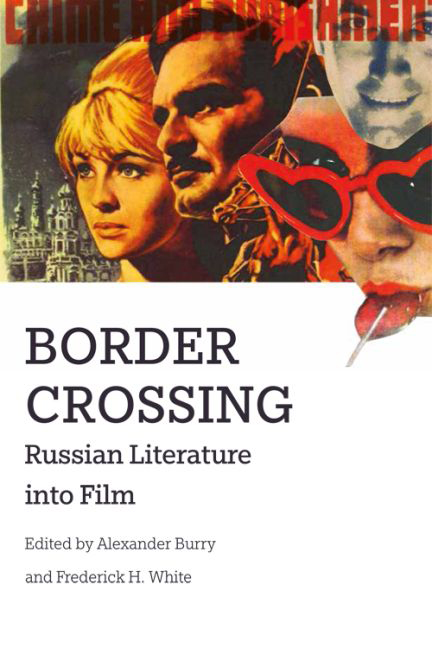Book contents
- Frontmatter
- Contents
- List of Figures
- Notes on the Contributors
- Introduction: Filming Russian Classics—Challenges and Opportunities
- 1 Across the Russian Border
- 2 Dostoevskii's “White Nights”: The Dreamer Goes Abroad
- 3 On Not Showing Dostoevskii's Work: Robert Bresson's Pickpocket
- 4 Stealing the Scene: Crime as Confession in Robert Bresson's Pickpocket
- 5 The Eye-deology of Trauma: Killing Anna Karenina Softly
- 6 “A Vicious Circle”: Karen Shakhnazarov's Ward no. 6
- 7 A Slap in the Face of American Taste: Transporting He Who Gets Slapped to American Audiences
- 8 Against Adaptation? The Strange Case of (Pod) Poruchik Kizhe
- 9 Chasing the Wealth: The Americanization of Il'f and Petrov's The Twelve Chairs
- 10 Fassbinder's Nabokov—From Text to Action: Repressed Homosexuality, Provocative Jewishness, and Anti-German Sentiment
- 11 “The Soviet Abroad (That We Lost)”: The Fate of Vasilii Aksenov's Cult Novel A Starry Ticket on Paper and on Screen
- Conclusion: Passport Control—Departing on a Cinematic Journey
- Bibliography
- Filmography
- Index
8 - Against Adaptation? The Strange Case of (Pod) Poruchik Kizhe
- Frontmatter
- Contents
- List of Figures
- Notes on the Contributors
- Introduction: Filming Russian Classics—Challenges and Opportunities
- 1 Across the Russian Border
- 2 Dostoevskii's “White Nights”: The Dreamer Goes Abroad
- 3 On Not Showing Dostoevskii's Work: Robert Bresson's Pickpocket
- 4 Stealing the Scene: Crime as Confession in Robert Bresson's Pickpocket
- 5 The Eye-deology of Trauma: Killing Anna Karenina Softly
- 6 “A Vicious Circle”: Karen Shakhnazarov's Ward no. 6
- 7 A Slap in the Face of American Taste: Transporting He Who Gets Slapped to American Audiences
- 8 Against Adaptation? The Strange Case of (Pod) Poruchik Kizhe
- 9 Chasing the Wealth: The Americanization of Il'f and Petrov's The Twelve Chairs
- 10 Fassbinder's Nabokov—From Text to Action: Repressed Homosexuality, Provocative Jewishness, and Anti-German Sentiment
- 11 “The Soviet Abroad (That We Lost)”: The Fate of Vasilii Aksenov's Cult Novel A Starry Ticket on Paper and on Screen
- Conclusion: Passport Control—Departing on a Cinematic Journey
- Bibliography
- Filmography
- Index
Summary
It is difficult to find an ambitious person who would not at some point write a screenplay.
We are abstract people. Each day divides us up between ten different activities. That is why we go to the cinema.
The rise of the so-called “formal method” in the immediate post-revolutionary years has been associated almost exclusively with questions of literary specificity, and with the search for a methodology that would not only exceed various forms of intentionalism and/or determinism, but would also destroy the pretensions of a general aesthetics to account for the presumably transgredient “essence” of art. As a consequence, the logical corollary of any claims for the specificity of the literary, namely that this implies also the formal specificity of the other modes of art from which literature is differentiated, has been just as consistently neglected: What does the differentiation of the means available to literature imply for “not literature,” whether “not literature” be seen primarily as the broad verbal context against which the literary defines itself (“practical language”), or as the technically variegated forms of art against which, in a sense, it competes—painting, music, theater, and of course cinema? This question takes on yet more practically dramatic dimensions when we consider the extent of the involvement in cinema of the leading Formalists, not just as theorists and critics, but also as writers and, in certain cases, administrators. The present chapter proposes, then, to proceed from a brief account of Formalist engagement with cinema to a more focused examination of the activity of Iurii Tynianov, and, specifically, the screen version of his story “Lieutenant Kizhe,” which will allow us to return to the question of artistic specificity, and to reconnect, on a necessarily provisional basis, to a more recent discourse around the relationship between literature and cinema—adaptation.
- Type
- Chapter
- Information
- Border CrossingRussian Literature into Film, pp. 165 - 187Publisher: Edinburgh University PressPrint publication year: 2016



